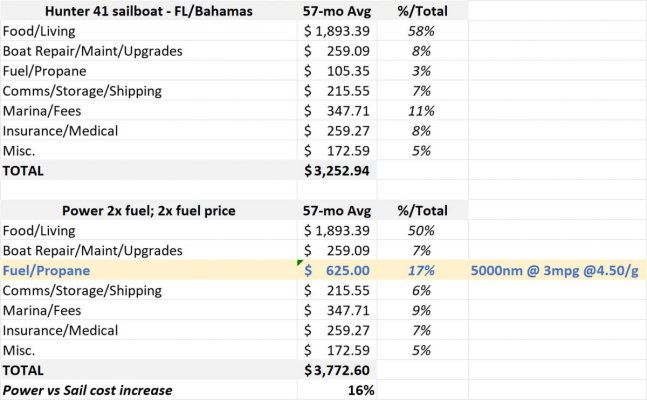You guys are definitely an outlier, so yea, I agree - your costs would not be useful. But there are many people who wonder what they should budget, whether their retirement will cover the costs, how fuel figures into the equation. For me, when I came across the CF guy and read his numbers, I realized he was living roughly what I anticipated living - not too frugal, but comfortable. $40k/year longterm would be roughly right. I think that's a range that many people are within 30%, plus/minus.
To say it has zero value is deflection. The build-up has line-item detail (which I truncated a bit), categories that folks may have never considered, and yes, you can get an idea of what the lifestyle the CF guy leads might be - it is roughly akin to what many folks in the middle-income retirement segment might be able to afford. A granular accounting is useful, at least to me. I can look and adjust for my use (such as fuel). But in the end, I feel like $40k/year is a decent budgetary number until I have actual data. That's far from zero value.
I am amazed at the number of people who chime in without input except a 'hurumph - useless information.' Many peole come to TF with questions like these.
Peter
Is $40k a decent budgetary number? I can't agree with that. I don't know the differences between your plans and the CF budgeter. I do agree that to look at his full spreadsheets and all the lines in them is of value. I often have posted lists of items to consider and recommend this link, not because the values are meaningful to most TF'ers, but because you break down the detail and you see line items you might otherwise fail to consider.
https://luxyachts.com/yacht-cost-calculator
Just click on "expand all" on the Summary of Expenses and really think about it. I see people jump in and two years later shocked at the cost of bottom painting. I see people who fail to anticipate their dinghy will have to be replaced. I see people who need internet connectivity and are shocked at the cost.
I use to hear 10% and yet people couldn't even agree on 10% of what? Current value? New Price?
What about depreciation? It's relevant to many.
What happens in year 7 when you need to rebuild an engine or replace a generator?
I've seen so many shocked when they needed to upgrade electronics. Seemingly small things like cruising permits for each country sure can add up. In South Florida we get so many who are shocked at everything from the cost of marinas to the need for divers 12 times a year.
I don't know if you'll be within 30% of $40k. However, I'd strongly advise you to do real line item budgeting before assuming that. Really look at your own situation.
I never said it had no value, just not to overvalue his numbers. For those use to budgeting, this shouldn't be a new experience, but I'm amazed at how many people don't do detailed personal budgets. We always have, but we've missed some substantially. Boat budgeting, I was conservative and have come well under in actual expenditures.
A good practice in budgeting is to arrive at the numbers from both directions, top down and bottom up. Now that you have a top down number of $40k plus or minus 30%, I'd encourage you or any others to start detailing every line. Get into the details of your plans. What about a couple that cruises all year but flies home and spends time with family during December. What does it cost to get someone to watch their boat while done? What does the trip home, now that they sold their home, cost?
The items you budget, you'll come close enough. However, one key is the items you overlook budgeting. I knew a couple that was fine when they cruised alone, but they invited family and friends to join them. They held values that said, "when you visit me, you don't pay.....anything". So, brother and his family, then old work friend, then son and his friend. Restaurants every night with company and entertainment in some places. Suddenly meals were double what they'd planned.
The point is I have no idea what you or anyone will spend. I can tell you the items to consider though. However, I don't want to see fuel $200 per month or $2400 a year. I want to see miles and hours plus generator hours and I want to see estimated costs per gallon based on cruising grounds and then I don't just have good numbers, but I have the ability to know the variability based on different costs. Right now, that is very important. Last year our fuel costs were up based on Europe, but this year we just changed our projection from $3/gallon to $6/gallon. That's very significant and while the absolute number for us is higher than trawler numbers, I suspect doubling fuel costs will be important to most.
Sorry, no shortcuts to budgeting. I admit that I suffer from a business mindset and reviewing and approving 1000's of department and profit center budgets over the years.
So, again, not saying your post has no value. Not saying the numbers have none. I think the spreadsheet he does is excellent. Just don't make the mistake of overestimating it's appropriateness for you or others.



